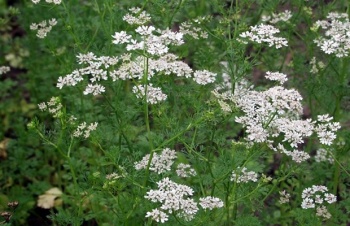Anise
From Wikiwel
Other Names: Anis, Anís, Anis Vert, Aniseed, Anise Essential Oil, Anisi Fructus, Graine d’Anis Vert, Huile Essentielle d’Anis, Phytoestrogen, Phyto-Œstrogène, Pimpinella anisum, Pinella, Semen Anisi, Shatpushpa, Sweet Cumin, Velaiti Saunf.
Pimpinella anisum, also called aniseed, is a flowering plant in the family Apiaceae native to the eastern Mediterranean region and Southwest Asia. Its flavor has some similarities with liquorice, fennel, and tarragon. The seed (fruit) and oil, and less frequently the root and leaf, are used to make medicine.
See also :
Special Precautions of Anise
- Aniseed oil is a very potent and the anethole contained in it can cause dermatitis in some individuals. It is best avoided in problem skin conditions.
- In large doses it can also slow down the circulation and can cause cerebral congestion.
- Pregnancy and breast-feeding: Aniseed oil must be avoided during pregnancy.
- Hormone-sensitive condition such as breast cancer, uterine cancer, ovarian cancer, endometriosis, or uterine fibroids: Anise might act like estrogen. If you have any condition that might be made worse by exposure to estrogen, don’t use anise.
- Anise contains a chemical, estragole, which has caused liver cancer in laboratory mice.
- Birth control pills (Contraceptive drugs) interacts with ANISE
- Estrogens interacts with ANISE
- Tamoxifen (Nolvadex) interacts with ANISE
- Eugenol can be potentially dangerous when ingested in higher amounts. It is hepatotoxic and can have several dangerous side-effects.
Benefits and uses of Anise are
- upset stomach
- intestinal gas
- runny nose
- expectorant to increase productive cough
- diuretic to increase urine flow
- as an appetite stimulant.
- Women use anise to increase milk flow when nursing, start menstruation, treat menstrual discomfort or pain, ease childbirth, and increase sex drive.
- Menstrual Pain : A combination of anise extract, saffron, and celery seed may help alleviate menstrual pain, according to a study published in the Journal of Midwifery & Women's Health in 2009.
- Hot Flashes : In a study published in the Iranian Journal of Pharmaceutical Research in 2012, researchers found that anise may help relieve hot flashes in women undergoing menopause.
- Breast Cancer : anethole, the organic substance known for its antimicrobial and antifungal properties, has proven in a study to stop breast cancer cells from growing. Not only that. It also prevents these cells from surviving. In fact, the anethole can cause the breast cancer cells to kill themselves altogether in some cases. This means that at the very least it can slow the growth and spread of breast cancer.
- Men use anise to treat symptoms of “male menopause.”
- treatment of seizures
- nicotine dependence
- trouble sleeping (insomnia)
- asthma
- Constipation : Taking a combination of anise, fennel, elderberry, and senna may help ease constipation, suggests a small study published in BMC Complementary and Alternative Medicine in 2010.
- Some people apply anise directly to the skin to treat lice, scabies, and psoriasis.
- In foods, anise is used as a flavoring agent. It has a sweet, aromatic taste that resembles the taste of black licorice. It is commonly used in alcohols and liqueurs, such as anisette and ouzo. Anise is also used in dairy products, gelatins, meats, candies, and breath fresheners.
- In manufacturing, anise is often used as a fragrance in soap, creams, perfumes, and sachets.
